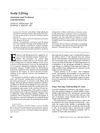 15 citations,
December 2007 in “Dermatologic Therapy”
15 citations,
December 2007 in “Dermatologic Therapy” Hair transplantation has improved with techniques that increase graft survival and patient satisfaction for more natural results.
 9 citations,
February 2005 in “Plastic and Reconstructive Surgery”
9 citations,
February 2005 in “Plastic and Reconstructive Surgery” Improved technique for facial surgery hides scars and maintains hairline.
 8 citations,
February 2020 in “Fertility and Sterility”
8 citations,
February 2020 in “Fertility and Sterility” Operative hysteroscopy is still the main treatment for Asherman syndrome, but more research is needed on post-surgery methods.
[object Object]  August 2016 in “InTech eBooks”
August 2016 in “InTech eBooks” Esthetic surgery complications can include infections, nerve injury, and more; proper evaluation and technique help prevent them.
 5 citations,
January 2021 in “Veterinary dermatology”
5 citations,
January 2021 in “Veterinary dermatology” Low-level laser therapy did not reduce licking or improve lesions in dogs with ALD but did increase hair growth.
 2 citations,
January 2019 in “Springer eBooks”
2 citations,
January 2019 in “Springer eBooks” The conclusion is that different blood diseases cause specific oral symptoms and require varied treatments to manage these symptoms and improve patient health.
[object Object]  August 2023 in “Dermatologic Surgery”
August 2023 in “Dermatologic Surgery” Wounding may stimulate hair growth, but more research is needed to confirm the safety and effectiveness of related treatments.
 33 citations,
April 2009 in “Journal of the American College of Certified Wound Specialists”
33 citations,
April 2009 in “Journal of the American College of Certified Wound Specialists” Bidirectional barbed sutures are effective and can reduce surgery time, with a low infection rate and potential cost savings despite being more expensive.
 7 citations,
March 2002 in “Aesthetic Surgery Journal”
7 citations,
March 2002 in “Aesthetic Surgery Journal” In 2002, hair restoration improved by using a different area for grafts and absorbable sutures, leading to less discomfort and better results.
 10 citations,
April 2010 in “Dermatologic Surgery”
10 citations,
April 2010 in “Dermatologic Surgery” Small changes in hair restoration surgery, like using special stitches and careful graft placement, can improve results and teamwork.
 4 citations,
August 2018 in “Journal of Cosmetic Dermatology”
4 citations,
August 2018 in “Journal of Cosmetic Dermatology” Wound tension after hair transplant surgery increases with strip size and is higher on the sides, affecting scarring.

Tailored nonsurgical cosmetic procedures are crucial for safely treating diverse skin types, especially skin of color.
 January 2018 in “Georg Thieme Verlag eBooks”
January 2018 in “Georg Thieme Verlag eBooks” Hair transplantation is a surgical procedure to move hair to bald areas, requires good donor hair, and results show in about a year.
 5 citations,
September 1994 in “The Journal of Dermatologic Surgery and Oncology”
5 citations,
September 1994 in “The Journal of Dermatologic Surgery and Oncology” Scalp lifting surgery can safely and effectively reduce baldness if done with careful planning and proper technique.
 January 2007 in “Elsevier eBooks”
January 2007 in “Elsevier eBooks” The document concludes that hair transplantation for Asians should consider unique scalp and hair traits, use small grafts, and combine surgery with medication like finasteride and minoxidil for best results.
July 2022 in “Indian Journal of Otology” A rare ear-area hair cyst was successfully removed from a 10-year-old boy.
 3 citations,
November 2017 in “The American Journal of Cosmetic Surgery”
3 citations,
November 2017 in “The American Journal of Cosmetic Surgery” The new Cosmetic Surgery Scar Assessment Scale (CSSAS) was found to be simple and effective in evaluating scars from hair restoration surgeries.
 3 citations,
July 1987 in “Dermatologic Clinics”
3 citations,
July 1987 in “Dermatologic Clinics” Scalp reduction can treat severe hair loss, but success depends on scalp flexibility and it may cause complications like pain, infection, and cosmetic issues.
1 citations,
January 2021 in “Clinical case reports” The Hotz-Celsus surgery successfully fixed inward-turning eyelids in cattle.
 January 2023 in “Operative Techniques in Otolaryngology-Head and Neck Surgery”
January 2023 in “Operative Techniques in Otolaryngology-Head and Neck Surgery” Hair transplants help transgender patients look more like their gender identity, with different procedures for trans women and men.
 140 citations,
August 2011 in “Biomaterials”
140 citations,
August 2011 in “Biomaterials” Keratose, derived from human hair, is a non-toxic biomaterial good for tissue regeneration and integrates well with body tissues.
 13 citations,
April 2020 in “Experimental Cell Research”
13 citations,
April 2020 in “Experimental Cell Research” PCAT1 helps hair growth by controlling miR-329/Wnt10b.
 39 citations,
July 2021 in “Stem Cell Research & Therapy”
39 citations,
July 2021 in “Stem Cell Research & Therapy” Using fat stem cells and blood cell-rich plasma together improves healing in diabetic wounds by affecting cell signaling.
 26 citations,
January 2016 in “Annals of Dermatology”
26 citations,
January 2016 in “Annals of Dermatology” Ecklonia cava polyphenols help increase human hair growth and reduce hair loss.
 January 1998 in “Lasers in Surgery and Medicine”
January 1998 in “Lasers in Surgery and Medicine” Lasers are effective and safe for various medical treatments, including cancer, wound healing, and skin conditions.
 50 citations,
December 2020 in “Bioactive Materials”
50 citations,
December 2020 in “Bioactive Materials” Wound dressing absorbs fluid, regenerates hair follicles, and heals skin burns.
 45 citations,
March 2020 in “ACS Applied Materials & Interfaces”
45 citations,
March 2020 in “ACS Applied Materials & Interfaces” The new biomaterial inspired by ancient Chinese medicine effectively promotes hair growth and heals wounds in burned skin.
 27 citations,
August 2006 in “Laboratory Investigation”
27 citations,
August 2006 in “Laboratory Investigation” SCF and ET-1 together significantly increase skin pigmentation and melanin production.
 21 citations,
November 2020 in “Chemical Engineering Journal”
21 citations,
November 2020 in “Chemical Engineering Journal” The hydrogel with silver and mangiferin helps heal wounds by killing bacteria and aiding skin and tissue repair.
 19 citations,
December 2016 in “PLOS ONE”
19 citations,
December 2016 in “PLOS ONE” Early-stage skin cells help regenerate hair follicles, with proteins SDF1, MMP3, biglycan, and LTBP1 playing key roles.




























